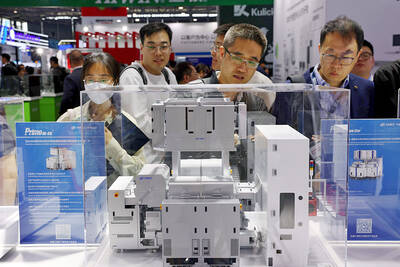Farglory Group (遠雄集團) is partnering with the InterContinental Hotels Group PLC to launch a new hotel next to the Taipei Dome under the British hospitality conglomerate’s brand, helping the name make a comeback in Taipei after 22 years, local media said.
However, InterContinental is to cease management of Hotel Indigo Hsinchu Science Park (新竹英迪格) next month, after the group ended its management of Imperial Hotel Taipei (台北華國大飯店) in the early days of the COVID-19 pandemic, the reports said.
The new property would be InterContinental’s fourth in Taipei after Kimpton Da An Hotel (金普頓大安酒店), Regent Taipei (台北晶華酒店) and Hotel Indigo Taipei North (英迪格).
Farglory Group previously intended to run the new property — featuring 400 guestrooms, four restaurants and additional banquet facilities — under its own Farglory (遠雄悅來飯店) brand, the reports said
The partnership with the British company would require adjustments and push back the new hotel’s opening to 2024, although construction of the building is mostly completed, the reports said.
InterContinental is seeking to increase its presence in Taiwan and is planning to open a new resort, Hotel Indigo Alishan, in the fourth quarter of this year, the reports said.
The property would have 84 luxury guestrooms near Alishan National Forest Recreation Area (阿里山國家森林遊樂區) in Chiayi County, they said.
However, InterContinental is to cease management at Hotel Indigo Hsinchu Science Park at the end of this month, and the property, owned by Riant Capital Ltd (子樂投資), would change its name to Hotel Episode Hsinchu (新竹伊普索酒店), communications officials said.
Riant Capital launched Hotel Indigo in 2018 on the former site of the unprofitable Miramar Hotel Hsinchu (新竹美麗信酒店), which closed in November 2017.
The name change is reportedly expected to cut losses, as the pandemic continues to weigh on the hospitality industry, especially properties heavily reliant on international business travelers.
While Hotel Indigo is wooing tech-savvy guests, Hotel Episode Hsinchu would target travelers seeking creative experiences, the officials said.

With this year’s Semicon Taiwan trade show set to kick off on Wednesday, market attention has turned to the mass production of advanced packaging technologies and capacity expansion in Taiwan and the US. With traditional scaling reaching physical limits, heterogeneous integration and packaging technologies have emerged as key solutions. Surging demand for artificial intelligence (AI), high-performance computing (HPC) and high-bandwidth memory (HBM) chips has put technologies such as chip-on-wafer-on-substrate (CoWoS), integrated fan-out (InFO), system on integrated chips (SoIC), 3D IC and fan-out panel-level packaging (FOPLP) at the center of semiconductor innovation, making them a major focus at this year’s trade show, according

DEBUT: The trade show is to feature 17 national pavilions, a new high for the event, including from Canada, Costa Rica, Lithuania, Sweden and Vietnam for the first time The Semicon Taiwan trade show, which opens on Wednesday, is expected to see a new high in the number of exhibitors and visitors from around the world, said its organizer, SEMI, which has described the annual event as the “Olympics of the semiconductor industry.” SEMI, which represents companies in the electronics manufacturing and design supply chain, and touts the annual exhibition as the most influential semiconductor trade show in the world, said more than 1,200 enterprises from 56 countries are to showcase their innovations across more than 4,100 booths, and that the event could attract 100,000 visitors. This year’s event features 17

Germany is to establish its first-ever national pavilion at Semicon Taiwan, which starts tomorrow in Taipei, as the country looks to raise its profile and deepen semiconductor ties with Taiwan as global chip demand accelerates. Martin Mayer, a semiconductor investment expert at Germany Trade & Invest (GTAI), Germany’s international economic promotion agency, said before leaving for Taiwan that the nation is a crucial partner in developing Germany’s semiconductor ecosystem. Germany’s debut at the international semiconductor exhibition in Taipei aims to “show presence” and signal its commitment to semiconductors, while building trust with Taiwanese companies, government and industry associations, he said. “The best outcome

Semiconductor equipment billings in Taiwan are expected to double this year, as manufacturers in the industry are keen to expand production to meet strong global demand for artificial intelligence applications, according to SEMI, which represents companies in the electronics manufacturing and design supply chain. Speaking at a news conference before the opening of Semicon Taiwan trade show tomorrow, SEMI director of industry research and statistics Clark Tseng (曾瑞榆) said semiconductor equipment billings in Taiwan are expected to grow by an annual 100 percent this year, beating an earlier estimate of 70 percent growth. He said that Taiwan received a boost from a